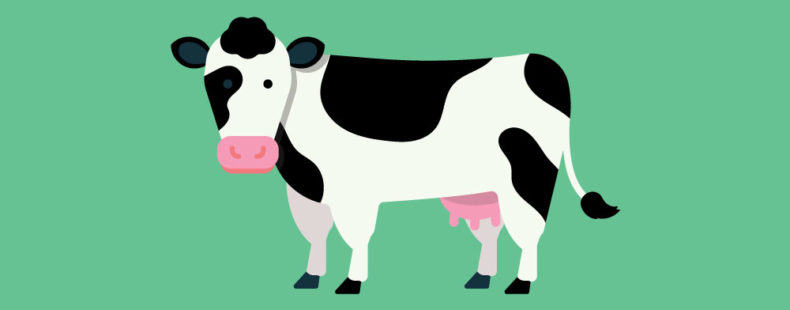Where Did Words Like Beef, Pork, Veal, Poultry Come From
Why Does A Cow Become Beef?
Published February 9, 2018

Have you ever stopped to wonder why nosotros swallow pork and beef, but not squealer or moo-cow? Menus don't advertise sheep or deer, just mutton and venison. And, nosotros nonchalantly nosh on veal without the linguistic reminder that we're actually eating meat from a babe calf.
When it comes to designating meat terminology, the English language linguistic communication has a few ways of distinguishing betwixt the live animal and the dead animate being on your plate. Why?
Norman Conquest cooks pig into pork
The explanation requires a brief lesson on the history of English. Today's topic: the Norman Conquest of England in 1066. In that year, the Anglo-Saxon king died and forgot to tell everyone who his successor was going to exist. Oops. The dead king (when he was alive) had promised the throne to the Norman duke William, shortly to exist known as "the Conqueror" considering of the expressionless male monarch's unfortunate oversight. A couple other in-laws of the dead king also vied for the throne. In that location was a large battle, William the Conqueror conquered, and the Anglo-Saxons came nether Norman rule.
A clash of swords became a battle of words as the Anglo-Saxons and Normans endeavored to empathize each other. The Normans spoke French and the Anglo-Saxons spoke Old English (deriving from West Germanic languages). As one would expect with a ruling form, the French Normans brought fancy terminology to the linguistic table, including words related to dignity, like crown and castle , and words related to food like banquet, sauce, biscuit, and roast.
The theory goes that the distinction betwixt terms for live animals and dead-brute meat was influenced past class differences betwixt Anglo-Saxon servants and Norman elites. Lexicographer Robert Burchfield calls the theory "an indelible myth." But, Bill Bryson, an author who has studied English and historical topics extensively, thinks the class theory is a "reasonable generalization."
It goes like this : Old-English words were used when describing the live animals, considering the lower-class Anglo-Saxon farmers and hunters were responsible for raising (and then killing) the animals. Fancier French words were introduced to describe the culinarily-transformed, tasty, and often expensive meats that would grace the tables of wealthy Normans (who weren't getting their hands bloody).
And then, we get a list of distinctions like this:
Animal (Anglo-Saxon, One-time English): Cu (cow),Picg (pig) or Swīn (swine),Scēp (sheep),Dēor (deer),Cealf (calf)
Meat (Norman, Old French): Buef (beef),Porc (pork),Moton (mutton),Venesoun (venison),Veel (veal)
Of course, later on the Norman Invasion, English didn't adopt all of the French words for "dead animals equally food." The animal fish, for case, and the food fish go by the same name, derived from the Old-English language/Germanic discussion fisc. One explanation for why English language didn't prefer the Norman term forfish is because the French give-and-take is poisson—much too close to poison in English, and nobody wanted to ingest that! (Actually, for real sticklers, toxicant is also a French word, so the French apparently didn't, and don't, have problem distinguishing betwixt the two.)
What almost chicken?
So, after the conquest, the Normans and Anglo-Saxons linguistically divided upwards pig/pork and moo-cow/beef. Did they do the same to fowl? Were the clucky alive birds called chickens and the unlucky dead ones poulets (French for "chicken")? And if so, why don't people enhance chickens and eat poulets now?
Information technology'southward non like the Anglo-Saxons were against French words for "chicken": afterward the invasion, the conquered people adopted poultry from the Quondam French pouletrie , meaning "domestic fowl." And, the English word pullet (meaning "young hen") comes from poulet, but it'southward little known outside the chicken-farming community. Why didn't poulet (or pullet) stick in English, the way pork and beef accept?
Perchance the animate being/meat stardom was simply meant for cloven-footed animals and non feathered fowl. For any reason, in English language, poultry aren't given singled-out names when their "goose is cooked," so to speak. Nosotros can't come upwards with a definitive respond; it's similar a chicken-and-egg conundrum.
What does the fauna/meat distinction exercise?
Moving away from these complex philosophical questions about poultry, the pig/pork, beef/cow distinctions from centuries ago point to a few interesting implications of calling expressionless animals (some of them anyway) by some other name once they're meant to be consumed.
Vegetarians, vegans, and animal-rights activists describe attention to what they see as the harmful consequences of maintaining the animal/meat stardom. Calling a expressionless cow beef is but one of the many means "animals are fabricated absent through language."
Just as what's presented on the plate no longer resembles a living, breathing creature, the words beef, pork, and veal disguise the fact that the repast is actually braised dead cow, slaughtered pig sandwich, or bashed baby cow scaloppini. Making the animal "absent" means the food is easier to eat.
Perhaps, that'south what the French Normans knew in the 11th century. Distinguishing between animal and meat provides some psychologically reassuring distance betwixt the eater and the in one case-living affair that'southward been slaughtered. And, even though chicken meat is chicken, words like tenders and nuggets help soften the reality of eating the dead.
The aforementioned kind of linguistic disguise is applied when the dish is peculiarly stomach-churning: "Rocky Mountain oysters" are actually fried dogie testicles.
(Want to give your stomach a real treat? Check out some other distasteful dishes in linguistic disguise here).
To sum it all up: The Normans may have introduced "nutrient" terms for animals to assist them feel better about eating them, simply researchers (centuries later) confirmed that there'due south a human bulldoze to do so. In 2016, Oslo University's Institute of Psychology showed that words like beefiness and pork "created emotional distance betwixt consumers and the animals they were preparing to swallow." Cow and pig, on the other mitt, brought participants closer to the reality of the "face on the plate."
Source: https://www.dictionary.com/e/animal-names-change-become-food/